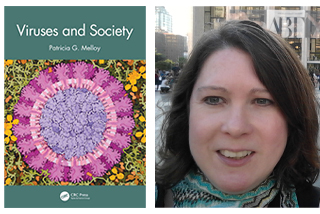Viruses and society
"Viruses and Society" is a textbook written by Patricia Melloy, professor of biological sciences, Fairleigh Dickinson University

“Viruses and Society” is geared toward professionals and students in college-level introductory biology courses devoted to understanding viruses, vaccines and their global impact. In approachable and simplified language, the book introduces cells, DNA and viruses themselves. This is followed by a review of how the immune system works and how scientists and physicians harness the immune system to protect people through vaccines. Specific chapters focus on the 1918 influenza pandemic, the fight to eradicate polio, the HIV/AIDS pandemic and the current COVID-19 crisis. Additionally, the book reviews the uses of viruses in genetic engineering and gene therapy. It concludes by describing public health initiatives to keep emerging viruses in check and the role of scientific communication in how viruses are perceived and have an impact on our society.
CRC Press
Are you an ASBMB member who has published a book recently?
If so, we’d like to feature your work in an upcoming issue of ASBMB Today. Please email a synopsis (under 100 words), an image of the book’s cover and your headshot to ASBMB Today.
Enjoy reading ASBMB Today?
Become a member to receive the print edition four times a year and the digital edition monthly.
Learn moreGet the latest from ASBMB Today
Enter your email address, and we’ll send you a weekly email with recent articles, interviews and more.
Latest in People
People highlights or most popular articles

Simcox wins SACNAS mentorship award
She was recognized for her sustained excellence in mentorship and was honored at SACNAS’ 2025 National Conference.

From humble beginnings to unlocking lysosomal secrets
Monther Abu–Remaileh will receive the ASBMB’s 2026 Walter A. Shaw Young Investigator Award in Lipid Research at the ASBMB Annual Meeting, March 7-10 in Washington, D.C.

Chemistry meets biology to thwart parasites
Margaret Phillips will receive the Alice and C. C. Wang Award in Molecular Parasitology at the ASBMB Annual Meeting, March 7-10 in Washington, D.C.

ASBMB announces 2026 JBC/Tabor awardees
The seven awardees are first authors of outstanding papers published in 2025 in the Journal of Biological Chemistry.

Decoding how bacteria flip host’s molecular switches
Kim Orth will receive the Earl and Thressa Stadtman Distinguished Scientists Award at the ASBMB Annual Meeting, March 7–10, just outside of Washington, D.C.

Thiam elected to EMBO
He was recognized during the EMBO Members’ Meeting in Heidelberg, Germany, in October.
